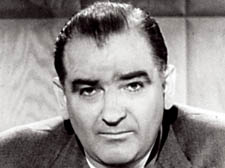|
|
 |
| |

Joe McCarthy. |
McCarthy’s bad guy role in a dark Hollywood drama
From Chaplin to Orson Welles, the anti-Communist witch-hunt led by Senator Joseph McCarthy took the tinsel off the town as he went after A-list ‘Reds’ in the magical world of the movies, writes Gerald Isaaman
WITCH-HUNT IN HOLLYWOOD.
By Michael Freedland with Barbra Paskin.
JR Books £12.99
HE died a wretch. In 1957, aged just 48. And deservedly so, since he had been drinking a quart of alcohol a day year after year, the more so as he practised his evil art of hurling unfounded accusations at famous people and watching them squirm.
Yet Joseph McCarthy, the Senator from Wisconsin, lives on today – by the very nature of “McCarthyism”, the name coined by a newspaper to describe his demented and unrelenting search for “Reds” under the big American bed, in the name of patriotism.
His bullying actions brought tragedy to thousands, uprooting lives and crashing careers, and no more so than in Hollywood, in a decade of fear from the late 1940s where McCarthy directed his search for subversive Communists in the magical world of the movies.
The roll call is of wondrous names galore, from Charlie Chaplin to Orson Welles, from Paul Robeson to Arthur Miller, Humphrey Bogart to Marlon Brando, Danny Kaye to Zero Mostel, Artie Shaw to Leonard Bernstein. Some 300 were blacklisted by McCarthy and his House of Un-American Activities Committee (HUAC) who decided they were Communists deemed unfit to live in the land of so-called freedom.
And as far as Michael Freedland is concerned the witch-hunt some 60 years ago, was equally a remarkable milestone in the history of anti-semitism. “For Communist read Jew,” he told me. “The investigations were as much – some would say more – anti-semitic as anti-Communist. Hollywood was chosen for the attack because of the great publicity value the movie capital offered. It was also a great opportunity to get at the Jews of Hollywood.”
Indeed, the major production companies were mainly ruled by Jews – only Sam Goldwyn was brave enough to speak out – with writers and directors also Jews, plus stars like tough guy John Garfield, born Julie Garfinkle, and explosive Kirk Douglas, born Issur Danielovitch, whose brave naming of blacklisted Dalton Trumbo as the true scriptwriter of Spartacus signalled the end of a rotten era.
Freedland’s extensive research, born out of two original series for radio, enabled him to talk to the relatives of those who suffered not only the indignity of being labelled a traitor for joining the Hollywood Anti-Nazi League but who were also forced to escape to Europe to restart shattered lives.
Some ended up in Hampstead, like the late Betsy Blair – star of the 1955 film Marty – whose first husband, Gene Kelly, was blacklisted.
Scriptwriter Bernard Vorhaus became part of the Hampstead furniture too, escaping to Europe after swapping houses with friends to keep the FBI confused. He became a minor property developer, just like the actor Larry Parks, who starred as Al Jolson in the biopic. His widow, Betty Garrett, told Freedland as the tears flowed: “He would have gone on to be a very big star. As he got older, he got better looking. He could do anything.”
The great Larry Adler was also among the local exiled elite. Even working here, he was denied an Oscar for his music in the film Genevieve.
Paul Robeson, another one-time Hampstead resident, refused to answer McCarthy, his defence including the fact that, as a black man, he was regarded anyway as a “a second-class citizen” in the country of his birth. It is a compelling, almost unbelievable saga and one that is most appropriate to return to now, when history is distorted for TV entertainment fun and fanaticism brings us destruction by suicide bombers.
There is, alas, one significant gap. There is no mention of Donald Ogden Stewart and his Communist wife Ella Winter, who settled in Prime Minister Ramsay MacDonald’s old house in Frognal, Hampstead. Donald was, after all, the Oscar-winning scriptwriter of The Philadelphia Story starring Katherine Hepburn and James Stewart, and much else, who learned his socialist values from the doorkeeper of the Savoy Hotel.
He and Ella, who died within days of each other in 1980, met at the funeral service for her first husband, the muck-racking journalist Lincoln Steffens, and brought a real touch of Hollywood glitz to Hampstead.
I recall interviewing him once when, still snoozing, he pointed to his Oscar at his bedside, alongside a bottle of fine malt, his fabulous Picasso painting on the opposite wall, and drawled: “Why should I move my ass (arse, if you prefer)!”
The kid from Columbus, Ohio, never forgave the country he loved for causing his demeaning exile, a searing sentiment that those who read Michael Freedland’s excellent story of tarnished Tinseltown will undoubtedly applaud. |
 |
|
|
 |
 |
|
 |
|


